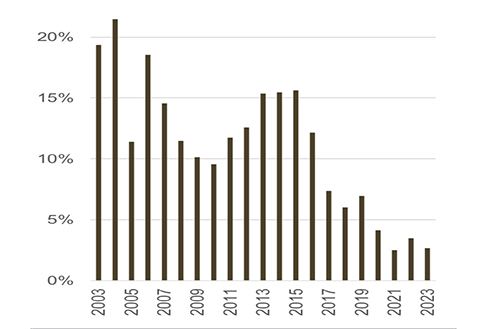Low credit levels being extended to businesses is worrisome for investment purposes. This, local stock brokerage Simonis Storm explained, is because businesses are rather concentrating on paying off existing debt than taking out new debt to invest in better infrastructure.
In its latest report on Public Sector Credit Extension (PSCE), SS noted that GDP during the second quarter of this year posted a growth of 3.7% year-on-year (y/y), which they noted will be at risk of remaining at these low levels if businesses continue this trend of being net repayors. “The high repo rate does not help the situation, as businesses and households have less appetite for credit and will rather dive into their savings. Although households’ credit figures remain strong and they make up most of the private sector loan portfolio, these loans tend to be small and short-term, often used to cover essential expenses,” the SS report reads.
The latest central bank figures indicate that PSCE increased by a weak 2.2% y/y in August 2023, lower than July’s growth of 2.6% y/y.
SS pointed out that this brings the year-to-date average to 2.7%, lower than all previous years, except 2021.
“Credit extended to the private sector has remained below 5% since January 2021, and for the current year it has never reached 4%. The high repo rate has decreased the demand for credit, specifically driven by businesses,” SS noted.
Bank of Namiba (BoN) figures indicated that businesses in the transport, fishing, services and wholesale and retail sectors have made large net repayments to lower their credit uptake.
BoN figures also show that credit extended to the private sector is currently at N$119.3 billion, which is N$59 million higher than credit extended in July
2023.
Of this amount, 56% is held by households, 38% by businesses and 6% by foreigners in August 2023. The average share of credit held by businesses has reached 26%, which is the lowest it has ever been since 2003, while households’ share in 2021 was the lowest (54%) and YTD, households’ average stake in credit is 55%. The remainder is taken up by foreigners.
Businesses (down 2% y/y) are net repayors of their debt for the fifth consecutive month in August 2023, while households (up 5.4% y/y) and foreigners (up 1.8% y/y) are net borrowers for the same month. According to BoN, demand for credit from businesses in the mining, wholesale and retail trade, financial and services sectors has slowed.
“Short-term facilities, such as, overdraft credit and other loans and advances contributed to this decrease in demand from businesses. At the same time, households are demanding less credit, and have specifically driven down overdraft credit and other loans and advances,” SS stated. Meanwhile, businesses remain net repayors of their mortgage loans for the twelfth consecutive month in August 2023, with the most recent negative growth of -4.4% y/y in August, while household mortgage loans increased by 3.1% y/y.
SS further pointed out that other loans and advances by businesses posted a consistent negative growth rate since May 2023 (down 5.5% y/y in August 2023), while households have been driving other loans and advances by double digit growth for the third consecutive month, posting a 14.9% y/y in August.
On a monthly basis, other loans and advances by business and households increased by 2.0% month-on-month (m/m) each. This, SS noted, was driven by higher demand from businesses in construction and building, and wholesale and retail sectors.
Moreover, overdraft credit extended to businesses decreased by 0.4% y/y, while household overdraft credit increased by 3.5% y/y in August 2023. Both businesses and households made higher net repayments to their overdraft credit in August 2023.
Although businesses are net repayors of overall
debt, instalment and leasing credit (up 17.7% y/y) have both been growing consistently since September 2021.
Households’ instalment and leasing credit have increased by a meagre 1.8% y/y in August 2023. Vehicle sales improved by a meagre 4.0% y/y in August, much lower than the consistent double digit growth figures witnessed in August 2022. 59% of vehicle purchases in August 2023 were cash transactions, while the remaining 41% were financed. According to BoN, these sales figures were driven by high demand from car rental companies.
“The Federal Reserve Bank and South Africa Reserve Bank kept their monetary policy rates unchanged at the meetings in September, and we project that BoN will follow this decision on the 25th of October 2023 keeping the repo rate at 7.75%. We remain steadfast on our expectation that BoN will hike the repo rate by at least 25bps in December, as higher oil prices have unlocked uncertainty for future inflation rates,” SS stated.


